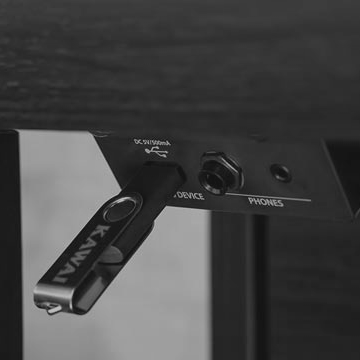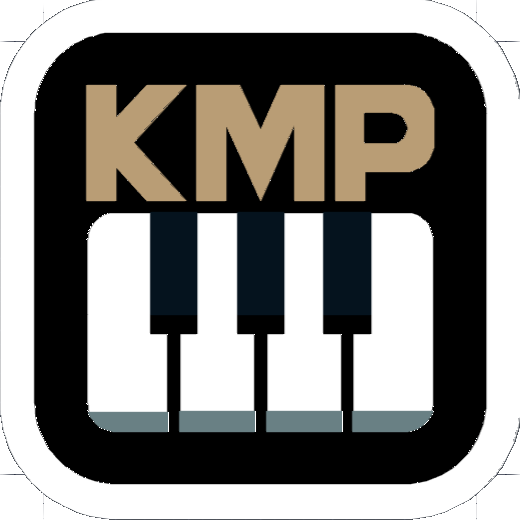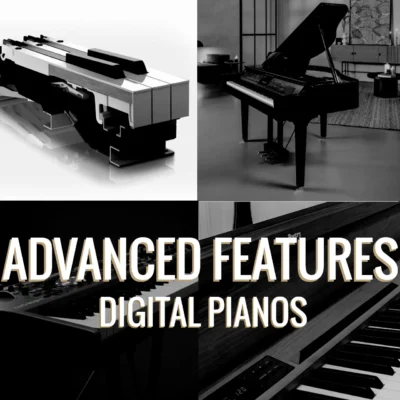Have you ever wondered what makes today’s digital pianos so incredibly sophisticated? After spending over 50 years at the piano bench and currently owning a Kawai CN33, I’ve witnessed firsthand the remarkable evolution of digital pianos with advanced features. Let me tell you – the technology we have access to today would have seemed like pure magic when I first started playing!

In this guide, I’ll share my expertise to help you navigate the exciting world of modern digital pianos and their innovative features. Whether you’re upgrading from an older model or making your first premium digital piano purchase, I’ll show you exactly what to look for in today’s high-tech instruments.
Key Action Technology: The Foundation of Advanced Digital Pianos
When I evaluate digital pianos with advanced features, I always start with the key action. Here’s what you should look for:
- Graded hammer action with counterweights (like Kawai’s Grand Feel III)
- Optical sensors for precise touch detection
- Ivory/ebony touch key surfaces for authentic feel
- Let-off simulation mimicking grand piano mechanics
- Multi-point sensing for improved key repetition
Sound Engine and Sampling Technologies
The heart of any advanced digital piano is its sound engine. Here’s where brands really differentiate themselves:
- Yamaha’s CFX Binaural Sampling offers incredible headphone performance
- Roland’s SuperNATURAL modeling creates organic, responsive tones
- Kawai’s SK-EX Rendering provides unparalleled dynamic range
- Nord’s Piano Library allows for sound customization
- Korg’s improved sampling technology delivers authentic resonance
Smart Connectivity Features That Matter
I’ve seen how modern connectivity has transformed piano practice. These features are game-changers:
- Bluetooth MIDI for wireless app integration
- USB audio/MIDI for recording and playback
- Mobile app compatibility for piano settings
- Cloud storage for backing up recordings
- Smart practice features with performance analysis
Advanced Learning Tools Worth Having
Based on my teaching experience, these learning features make a huge difference:
- Built-in lesson functions with progressive difficulty
- Score display capabilities
- Recording and playback for self-evaluation
- Metronome with rhythm section accompaniment
- Performance analysis tools
Professional Performance Features to Consider
For serious pianists, these advanced features are invaluable:
- Virtual Technician settings for tone customization
- Multi-track recording capabilities
- Sound layering and split modes
- Concert play features with orchestral backing
- Quick selection options for live performance
Making Your Final Decision
After testing countless digital pianos with advanced features, here’s my advice for making your choice:
- Prioritize key action and sound quality above all else
- Consider which smart features you’ll actually use
- Test the piano’s user interface – it should be intuitive
- Think about future needs – advanced features often grow with you
- Don’t forget about speaker quality and headphone performance
Final Thoughts on Modern Digital Pianos with Advanced Features
As we wrap up this guide, I want to emphasize how fortunate we are to live in an era where digital pianos with advanced features have become so sophisticated. When comparing today’s options to my trusty Kawai CN33, the technological leap is simply astounding. The latest digital pianos with advanced features from brands like Yamaha, Roland, and Kawai have transformed what’s possible in a home instrument.
What excites me most about these digital pianos with advanced features is how they’re democratizing access to premium piano experiences. Whether you’re a beginner who needs comprehensive learning tools, a teacher requiring connectivity options, or a performing artist demanding the most realistic touch response, there’s never been a better time to invest in your musical journey.
Remember, the perfect digital piano is out there waiting for you. Take your time, try different models, and focus on the features that will support your musical growth. And if you need any additional guidance in your search for the ideal instrument, don’t hesitate to reach out. Happy piano shopping!
FAQ
What’s the most important advanced feature to look for in a digital piano?
Based on my experience, the key action technology is paramount. Look for pianos with optical sensors and graded hammer action, as these provide the most realistic playing experience and best connection to the instrument’s sound engine.
Are digital pianos with advanced features worth the higher price?
Yes, if you plan to play regularly. Advanced features like detailed sound modeling, precise key sensors, and comprehensive learning tools will enhance your playing experience and help you progress faster. I’ve found that students with better instruments typically stay more motivated.
How do I know if I need all these advanced features?
Consider your playing goals. If you’re serious about developing proper technique, features like realistic key action and detailed sound modeling are essential. If you’re also teaching or performing, connectivity options and professional performance features become very valuable. Start with the features that align with your immediate needs but consider future growth too.


